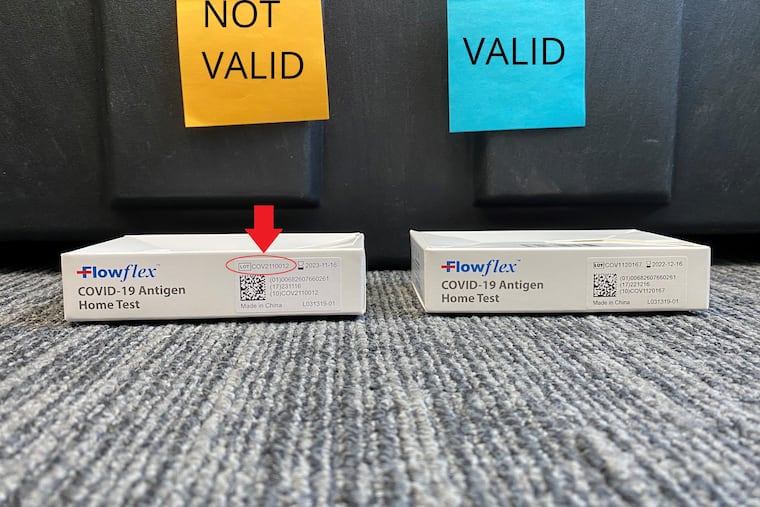Philly received more than 100,000 ‘invalid’ COVID-19 rapid tests. Here’s what to do if you got one
People who received Flowflex rapid tests should check the lot numbers on the box, health officials said.

The Philadelphia health department is recalling tens of thousands of COVID-19 rapid tests after it discovered that the tests were invalid during a routine inventory check, health officials said.
People who received Flowflex rapid tests should check the lot numbers on the box, health officials said. Any boxes with the lot number COV2110012 are invalid, meaning they were not made by Flowflex’s manufacturer, ACON Industries.
Where the tests came from, and whether they work, is unclear.
People who do find a test with the invalid lot number should not use it and instead get a replacement test at one of the city’s five resource hubs, the department said.
The health department received around 105,000 of the invalid tests and distributed 4,000 of them on its own. Another 43,000 were sent to organizations working with the department to distribute tests and other COVID resources; it’s unclear how many those organizations have already given out, said James Garrow, the health department’s communications director.
The remaining tests are still in storage, and the health department will not distribute them.
Garrow said the city received the tests from a distributor who purchases testing kits, masks, and other pandemic mitigation equipment from wholesale retailers. The city has been working with the distributor since 2021, he added.
“I’m not sure where these tests got put into the pipeline,” he said.
» READ MORE: We want to hear your thoughts about this and other health-related articles. Please fill out our Eds and meds survey.
Invalid tests discovered in Philly
The invalid tests were discovered when department staff were checking the expiration dates of the COVID tests they have stockpiled. The Food and Drug Administration has recently extended the shelf lives of many COVID tests, and runs a website where customers can search for the lot numbers printed on their COVID tests and check for new expiration dates.
But when checking a certain batch of Flowflex tests, health department staff couldn’t find the lot number on the FDA’s site at all.
Garrow said the department then sent a sample of the tests to ACON Industries and was told that the manufacturer didn’t make them.
It’s not clear who made the tests, or why.
“They look exactly the same [as the legitimate tests]. The only difference is the lot number is a bad lot number,” Garrow said. “Someone went to a lot of trouble to do this.”
The FDA has alerted customers of counterfeit Flowflex tests circulating nationwide, but this is the first time Philadelphia’s health department has encountered them, Garrow said.
The discovery is concerning, Garrow said, as COVID cases are on a slight uptick, and the department worries that patients might lose trust in rapid tests that the public has come to rely on for home diagnoses. The department is “developing processes” to prevent obtaining more faulty tests, he said.
“Not only should you have tests at home in case someone is feeling under the weather, but you should have faith that those tests can correctly diagnose you,” health commissioner Cheryl Bettigole said in a statement.